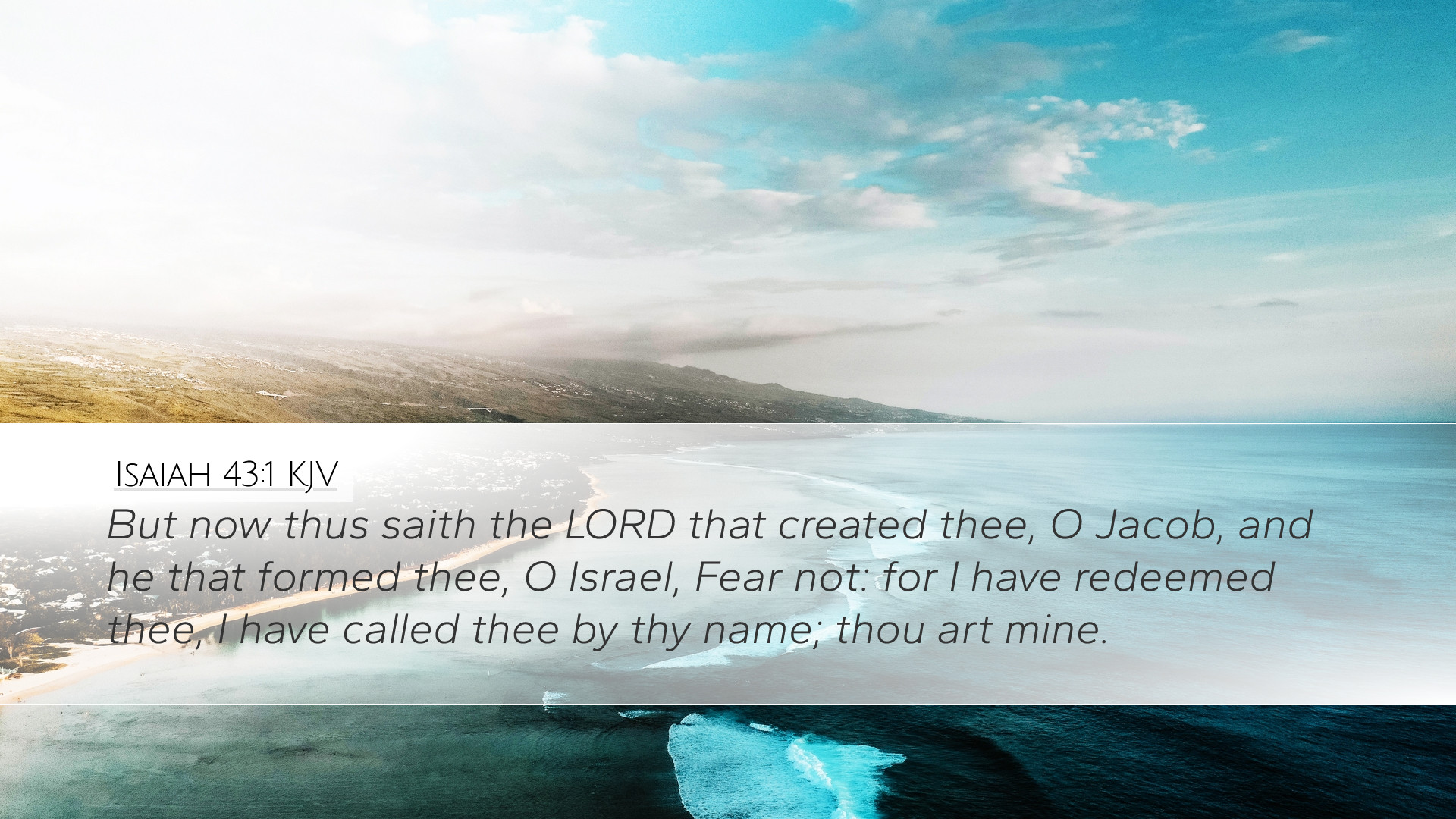Commentary on Isaiah 43:1
Verse: “But now thus says the Lord, He who created you, O Jacob, he who formed you, O Israel: ‘Fear not, for I have redeemed you; I have called you by name, you are mine.”
Introduction
This verse from the book of Isaiah encapsulates profound theological truths concerning God's relationship with His people. In the context of Israel’s historical struggles and spiritual wandering, this verse serves as a beacon of hope and assurance. By synthesizing insights from various public domain commentaries, including those by Matthew Henry, Albert Barnes, and Adam Clarke, we aim to illuminate the rich layers of meaning contained within this passage.
Analysis of Key Phrases
-
Creation and Formation
Isaiah begins with a declaration of God's sovereignty as the Creator: “He who created you, O Jacob, he who formed you, O Israel.” Here, Henry emphasizes the intimacy of God’s involvement in the creation of Israel, highlighting that God not only created them but has also intricately shaped their identity. Barnes notes that this affirms Israel's distinctiveness and purpose among the nations, serving as a reminder of the covenant relationship established with their forefathers.
-
Fear Not
The command “Fear not” is both a reassurance and an imperative. Adam Clarke interprets this as God’s antidote to the fears that stem from pending judgments and hardships. He emphasizes that God does not disregard their struggles; instead, He provides comfort and courage in their trials. This phrase appears frequently throughout Scripture, often signaling divine intervention and support.
-
Redemption
“For I have redeemed you” speaks to the historical context of Israel's exodus from Egypt and their subsequent deliverance from captivity. Barnes suggests that this redemption is deep-rooted in the act of liberation and restoration. It symbolically stretches to spiritual redemption, emphasizing Christ’s ultimate sacrifice. Henry draws attention to the importance of recognizing that redemption is a past act with present implications for God’s people—they are not merely saved from external oppression but brought into a meaningful relationship with Him.
-
Calling by Name
The phrase “I have called you by name” implies a personal and direct relationship. Clarke points out that God’s calling establishes identity and belonging. It signifies that they are known and valued individually. This is crucial for theologians as it underlines the doctrine of personal salvation and relational sovereignty of God toward humanity, emphasizing that each believer is uniquely identified and significant in God’s eyes.
-
You Are Mine
The concluding affirmation “you are mine” serves as the ultimate expression of belonging. Henry articulates that this ownership comes with responsibilities and privileges. It highlights God’s protective nature and His commitment to His people. For pastors and students of theology, this phrase compels reflection on the depth of God's love and the serious obligation that accompanies such a relationship—namely, faithfulness and loyalty to God.
Theological Implications
-
God's Sovereignty
This passage affirms God’s sovereignty over creation and His people. It underscores the belief that God is actively involved in the course of history and the spiritual journey of His people, which is a critical consideration for theologians and scholars alike.
-
The Nature of Redemption
Redemption here is multidimensional—it reflects physical, emotional, and spiritual dimensions. It invites theological exploration into the nature of God's saving work, the implications for soteriology, and the understanding of grace.
-
Personal Relationship with God
The personal nature of God’s interaction emphasizes that faith is not merely a collective or cultural concept but an individual experience. For pastors, this bears tremendous weight in counseling and teaching, as it encourages personal application of faith within congregations.
Conclusion
Isaiah 43:1 stands as a resounding declaration of hope and identity for God’s people. The combined insights from esteemed commentaries reveal layers of meaning that speak to the heart and soul of both collective and individual faith experiences. The passage reassures us of God’s readiness to redeem, to protect, and to embrace each believer as part of His family, urging us to live out our identity confidently. In our studies and ministries, may this verse serve as a source of comfort and motivation to proclaim the great truths of God’s love and sovereignty.


